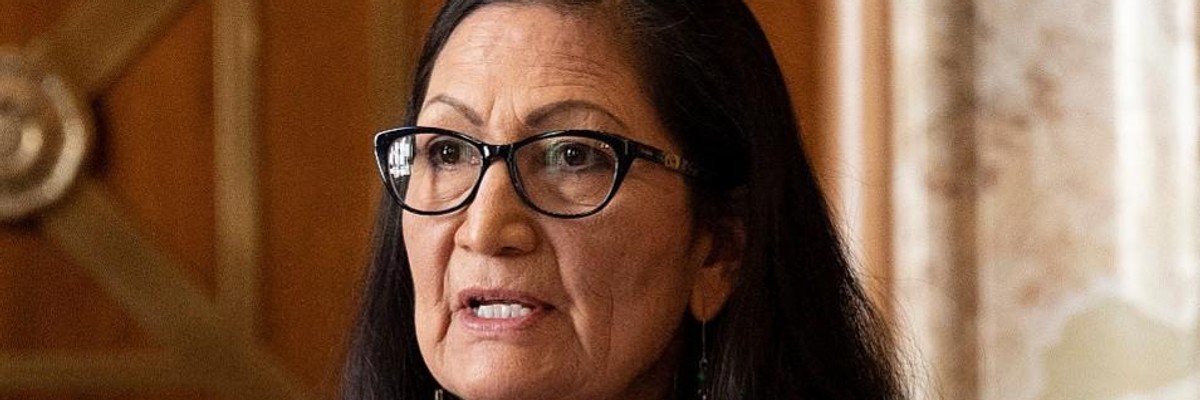Human rights defenders on Friday applauded the announcement by U.S. Interior Secretary Deb Haaland that the Bureau of Indian Affairs will establish a unit tasked with investigating missing and murdered Indigenous people.
"Violence against Indigenous peoples is a crisis that has been underfunded for decades. Far too often, murders and missing persons cases in Indian country go unsolved and unaddressed, leaving families and communities devastated."
--Interior Secretary
Deb Haaland
The Interior Department said in a statement Thursday that "approximately 1,500 American Indian and Alaska Native missing persons have been entered into the National Crime Information Center throughout the U.S., and approximately 2,700 cases of murder and nonnegligent homicide offenses have been reported to the federal government's Uniform Crime Reporting program."
The agency said that the new Missing & Murdered Unit (MMU) "will help put the full weight of the federal government into investigating these cases and marshal law enforcement resources across federal agencies and throughout Indian country."
The MMU will build on the work of Operation Lady Justice, a task force on missing and murdered Indigenous people launched in 2019.
"Investigations remain unsolved often due to a lack of investigative resources available to identify new information from witness testimony, re-examine new or retained material evidence, and review fresh activities of suspects," the Interior Department statement said. "The MMU, in addition to reviewing unsolved cases, will immediately begin working with tribal, BIA, and FBI investigators on active missing and murdered investigations."
Haaland--the first Native American Cabinet secretary in U.S. history--said Thursday that "violence against Indigenous peoples is a crisis that has been underfunded for decades. Far too often, murders and missing persons cases in Indian country go unsolved and unaddressed, leaving families and communities devastated."
"The new MMU unit will provide the resources and leadership to prioritize these cases and coordinate resources to hold people accountable, keep our communities safe, and provide closure for families," Haaland continued. "Whether it's a missing family member or a homicide investigation, these efforts will be all hands on deck."
"We are fully committed to assisting tribal communities with these investigations, and the MMU will leverage every resource available to be a force-multiplier in preventing these cases from becoming cold case investigations," she added.
According to the Coalition to Stop Violence Against Native Women, Indigenous women are murdered at 10 times the national average. Statistics from the U.S. Centers for Disease Control and Prevention show homicide is the third-leading cause of death among American Indian and Alaska Native girls and women ages 10 to 24 and the fifth-leading cause of death for those between the ages of 25 and 34.
A 2016 National Institute of Justice report (pdf) found that 84% of Indigenous women have experienced violence in their lifetimes, 41% had been physically injured by intimate partners, and 67% were concerned for their safety.
Two years later, a survey (pdf) published by the Seattle-based Urban Indian Health Institute reported 5,712 cases of missing and murdered Indigenous girls in 2016, of which only 116 were logged in the U.S. Department of Justice's federal missing persons database.
May 5 is National Day of Awareness for missing and murdered Native women and girls.

